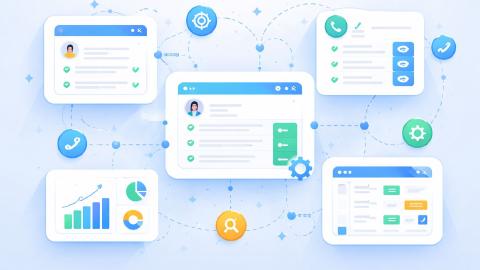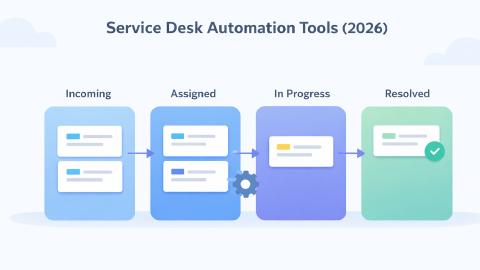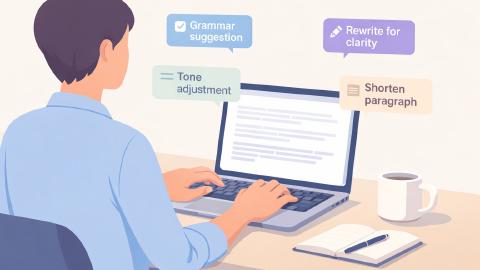10 Time-Tested Test Taking Strategies for Students in 2026
Use these test taking strategies to study smarter and ace your next test or exam in 2026.
Preparing for tests can feel stressful, especially when you’ve reviewed your notes and still aren’t sure what to expect on test day. It’s common to feel pressure to remember everything, keep track of time, and avoid small mistakes that can cost points.
Since the COVID-19 pandemic, student performance on standardized tests for math are worsening, research shows.
This shows the need of having reliable test taking strategies. They make the whole process easier by giving you a clearer plan and helping you stay calm when it matters most.
In this article, we'll outline 10 time-tested test taking strategies that you can use to ace your next test or exam in 2026. Let's dive in!
Why is Test Prep Important?
Preparing ahead of time makes studying feel more manageable and helps you avoid last-minute stress. It also gives you a clearer sense of what your teacher or professor expects, which helps you stay focused during the test.
Here are a few reasons why effective test prep is important:
Build stronger recall - Reviewing material early helps you store information in long-term memory. This makes it easier to pull up key details when the test gets challenging.
Boost overall confidence - Having a set study plan reduces uncertainty and helps you feel more prepared on test day. Feeling calm makes it easier to think clearly.
Avoid common mistakes - Practicing sample questions helps you spot common errors and understand how questions are usually written. That extra familiarity can save you from losing points on simple oversights.
Improve pacing and timing - When you study with timed practice, you learn how to pace yourself across different sections. This helps prevent rushing at the end or getting stuck too early.
Strengthen topic understanding - Intentional prep helps you break down topics, find connections, and strengthen weak areas. You end up with a more complete picture of the material.
Good test prep sets you up for smoother test days and better scores. With the right habits, you give yourself a real advantage before you even start the test.
10 Universal Test Taking Tips & Strategies
Here are 10 universal test taking tips and strategies that you can use to ace your next test in 2026:
1. Build a steady review routine
A consistent study routine helps you remember information over a longer period of time. Short, focused sessions several days a week prevent burnout and make studying feel less overwhelming.
This approach also gives your brain more time to make connections between topics. When you spread out your review, you avoid the pressure of cramming the night before. Over time, this routine makes studying feel more natural.
2. Get familiar with the test structure
Understanding how a test is set up helps you know what to expect when you sit down to take it. Looking at sample questions or practice tests gives you a clearer sense of timing and difficulty. This reduces the stress that comes from being surprised by new formats.
You can also learn how different sections are weighted, which helps you plan where to focus your time. The more familiar you are with the layout, the easier it is to stay calm on test day.
3. Practice with real timing
Working under realistic time limits trains your brain to think quickly and stay organized. It teaches you how much time you can safely spend on each question before moving on.
Timed practice also helps you build stamina for longer exams, like the SAT or ACT.
When the real test arrives, the timing feels familiar instead of stressful. This makes the whole experience smoother and more manageable.
4. Reduce distractions while studying
A focused study environment makes it easier to absorb information. Turning off notifications, closing unused tabs, and clearing your workspace removes unnecessary interruptions.
When you study without distractions, you finish faster and learn more effectively. It also helps you stay in a steady rhythm, especially during longer sessions. Over time, this habit improves both your focus and your confidence.
5. Study in smaller chunks
Just about any resource providing study tips will tell you this one. Break your study time into shorter blocks helps you stay motivated and focused. It’s much easier to commit to twenty or thirty minutes of real concentration than a long session that drains your energy.
This is known as the Pomodoro technique, where you work in short, focused intervals followed by quick breaks. It helps you stay sharp and reduces burnout, especially on busy days.
Here's what it would look like:
Study for 25 minutes, then take a 5-minute break.
Review your notes for 15 minutes, then step away for a quick reset.
Work through practice problems for 20 minutes, then pause to check your answers.
With steady, focused blocks like these, you make real progress without feeling overwhelmed, even when juggling a packed schedule.
6. Test yourself before the real test
Self-testing is one of the most effective ways to study because it forces your brain to actively pull information from memory.
This technique, often called active recall, helps you understand what you truly know compared to what you only recognize from rereading. It also helps you move beyond simple rote memorization by pushing you to explain concepts in your own words.
You can use flashcards, practice questions, or your own quiz-style notes to check your understanding. Over time, this makes it easier to remember details and spot topics that still need more review. When test day comes, you’ll feel more confident and prepared.
Use AI Blaze to study better with AI for FREE.
7. Understand how questions are written
Many tests use specific wording and formats that change how you should approach each question. Paying attention to these patterns helps you avoid small mistakes and study more intentionally.
Different question types also require different study strategies, so knowing what to expect can save you a lot of stress on test day.
Multiple choice questions often include keywords like “least,” “except,” or “most likely,” so practice reading them slowly and eliminating wrong choices.
Short answer questions require clearer explanations, so focus on summarizing topics in your own words during study sessions.
Essay questions test how well you connect ideas, which means you should practice outlining arguments and organizing your thoughts.
Matching or fill-in-the-blank questions depend more on memory, so quick drills and vocabulary review help a lot.
By studying based on the types of questions you’ll face, you understand the material more completely and avoid getting tripped up by confusing phrasing or unfamiliar formats.
8. Move on when you're stuck
Getting stuck on a tough question is normal, but staying stuck wastes valuable time. Mark it, move on, and come back once you’ve answered the easier questions.
This keeps your momentum going and helps you stay calm. Often, another question later in the test can help jog your memory. A quick return with a clearer mind can lead to a better answer.
9. Use simple systems on test day
Once the test begins, having a few reliable habits helps you stay calm and make steady progress. These small actions keep you organized, lower the chance of mistakes, and make it easier to manage your time. Think of them as quick checkpoints you can use throughout the entire exam.
Here are a few things to do while taking the test:
Read each question slowly before looking at the answer choices.
Underline or circle keywords so you don’t miss important details.
Cross out options that are clearly wrong to narrow your focus.
Mark tough questions and come back once you’ve answered the easy ones.
Keep an eye on the clock, but don’t check it so often that it breaks your focus.
Re-read your final answers if you have extra time, especially for questions you flagged.
Using small systems like these helps you stay in control from the moment the test starts until the moment you turn it in.
10. Create personalized study guides
Creating your own study guides helps you understand the material instead of just re-reading notes. Study guides also make it easier to review large chapters quickly.
There are many AI tools out there that help you create study guides, but AI Blaze is the best overall study tool available.
AI Blaze is your personal studying assistant that helps you quickly generate study guides, take notes, answer questions, solve problems, and much more!
With AI Blaze, you can use AI to generate study guides based on your textbook, syllabus, or any other course materials in just a few seconds! Plus, it works on any website!
Here's how AI Blaze can help you out:
AI that helps you study your way - AI Blaze can help you study with practice tests and study guides for any subject.
Turn any page into an interactive study session - AI Blaze can turn any website or page into an interactive study session. Quiz yourself, take notes, make a study guide, ask questions, and more.
Review chapters and quiz yourself with AI - AI Blaze can answer your questions and help you review whenever you need it.
No file uploads necessary! With AI Blaze, you can create study guides, generate notes, and answer questions anywhere online without having to upload any files!
AI Blaze is free! - Forget about annoying licenses or subscriptions.
Use AI Blaze to study better with AI for FREE.
Test Taking Strategies FAQ
Multiple Choice Test Taking Strategies
Multiple choice tests often check your ability to evaluate options. Here's a general strategy to follow:
Start by reading the question carefully before looking at the answers.
Eliminate the choices that are clearly wrong, then compare the remaining ones more closely.
If you’re stuck, look for keywords that point to what the question is really asking.
When time is tight, make a quick guess rather than leaving anything blank.
Test Taking Strategies for Elementary School
Younger students benefit from simple routines and clear expectations. Encourage them to read directions slowly so they don’t skip steps.
They should also practice taking short breaks when studying to help with focus. Visual tools like checklists or color-coded notes can help them stay organized. With clear structure, elementary students can build good habits early.
Test Taking Strategies for Middle School
Middle school students are juggling more classes and assignments, so planning ahead matters. They should start by reviewing notes weekly instead of waiting for a test announcement.
It helps to use practice quizzes to get comfortable with different question types. Organization tools like planners can support time management. As tests get harder, these habits make the workload feel more manageable.
Test Taking Strategies for High School
High school tests often require deeper understanding instead of simple memorization. Students should focus on summarizing chapters, reviewing class discussions, and practicing with real examples.
Working in study groups can help high school level students think through tougher topics. It's a great strategy for learning at this stage.
Creating outlines or charts is helpful for organizing information. These steps make studying feel less overwhelming, especially during busy weeks.
Test Taking Strategies for College
College exams often cover large amounts of material, so starting early is essential. Students should break their studying into smaller topics and review them regularly.
It’s helpful to attend office hours or ask questions when something feels unclear. Practice questions, study guides, and review sessions make a big difference during heavy course loads. A steady pace helps prevent last-minute stress.
Use AI Blaze to study better with AI for FREE.
Test Taking Strategies for the SAT and ACT
Both the SAT and ACT require strong reading, math, and time management skills. Practicing with official sample tests helps students get used to the question style and pacing.
We recommend reviewing common question types so you know what to expect. While preparing, focus on understanding mistakes rather than just taking test after test.
With consistent practice, you can build confidence for test day.
Build Better Testing Habits in 2026
Strong test taking habits make studying feel more manageable and help you feel more confident on test day. By reviewing regularly, staying organized, and using simple systems during the exam, you give yourself a clearer plan and avoid the stress that comes from guessing your way through it.
These strategies work across grade levels, subjects, and test formats, so you can adjust them to fit your routine. With steady practice and the right approach, doing well on tests becomes much more achievable.
To recap, if you want to create personalized study guides, give AI Blaze a try. AI Blaze is your personal AI study assistant that helps you create study guides and turn any page into an interactive study session for free!
Give AI Blaze a try for free!




